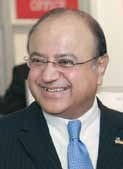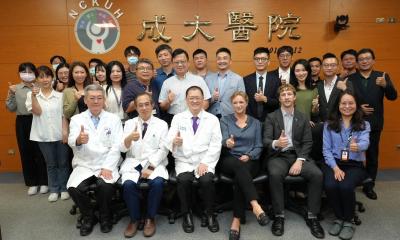‘Deal-making at Medica creates jobs’
Export success is driven by transactions, and the ‘buzz’ at Medica is generated by thousands of small companies making deals that build business, according to the head of the U.S. Foreign Commercial Service.

States & Foreign Commercial Service:
“My job is to out-commercialize the rest of the
world.”
Suresh Kumar has seen more than a few international trade shows during his career, yet this was his first visit to Medica as the Director General of the United States & Foreign Commercial Service for the U.S. Department of Commerce. “Things are really happening on the floor at this show,” he said, relating his impressions of the world’s largest trade fair for medical technologies. “The buzz at Medica is really different here,” he said, created by executives from smaller companies making contacts, renewing contacts, meeting on-the-ground with the people who make up their networks and as a result, make their business.
Where big expositions for the aeronautic or automotive industries are dominated by large companies, he said, Medica is defined by thousands of small- and mediumsized enterprises (SMEs). “This is purely a transactional event, it is all about making deals,” he said, adding that export success is driven by these transactions because increased sales for an SME directly stimulates job creation. Assistant Secretary Kumar is very focused on American SMEs as a strategic priority to support the National Export Initiative (NEI) launched in 2009 by President Barrack Obama.
“This initative has galvanized our efforts with two very clear goals to double U.S. exports and to create two million new jobs,” he said, reporting that 20 months later NEI has increased exports 17% and that this year an additional 300,000 jobs will be created. “President Obama said to win the future, the U.S. needs to outinnovate the rest of the world. My job, the contribution of our group at the Commerce Department, is to outcommercialize the rest of the world,” he said. Innovation in the medical technology sector presents unique opportunities for SME innovation, he said. “In healthcare, innovation happens in real-time. It is an industry where companies can move quickly from an idea to a device to a patent and then sales,” he said. “This is why Medica is such a great event for the tremendous concentration of innovation that is clustered here.”
Kumar said he noted that after dealmaking, the most important activity for SME executives at Medica is ‘intelligence gathering,’ or shopping new ideas introduced by competitors from around the world. A second opportunity for innovation in medical technology is what he called a tension that he saw clearly at Medica between companies supplying hospitals with devices for in-patient treatment and care, while another large part of products aim to bring patient treatment and care out of the hospital and into the community setting or the home setting. Asked how in one word he would position U.S. medical products compared to other countries, Kumar had no hesitation in underlining ‘quality.’ “You might suggest there are highend, high-priced products and on the opposite side show that there are lowend, low-priced products, but is this the right measure?” he asked. “What we put into our bodies, and what doctors choose to treat your body is rarely defined by its price. It is defined by its quality,” he said. “The United States is well-positioned with top quality products supported by continual innovation,” he added, offering as evidence that “U.S. products have won the largest share of the market in Europe with quality, and U.S. exports lead in Japan as well.”
The opportunity in emerging markets, such as India and China, present a new challenge in the mix of quality and pricing. The U.S. Pavilion at Medica this year sold out in record time, attracting a record 450 companies gathered in two exhibition areas., according to Anette Salama, a specialist in Healthcare Technologies for the U.S. Commercial Service in Düsseldorf. The CEO Incubator program, which accepts 24 executives who are trying international trade for the first time, was filled six months ahead of Medica, she said.
17.11.2011





